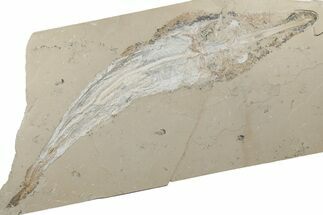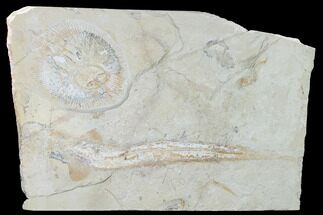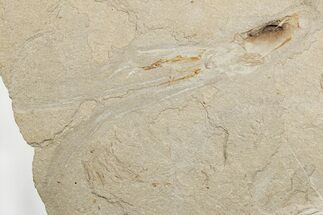This Specimen has been sold.
4.7" Cretaceous Predatory Fish (Eurypholis) - Squid In Stomach!
This is a 4.7" long example of an uncommon predatory fish, Eurypholis sp.. This fish was quarried from the famous Upper Cretaceous aged, marine lagerstätte near Hakel, Lebanon. There is a small squid within the stomach of this fish, its presence is indicated by the dark brown/purple color near the center of it.
There are two repaired cracks through the rock that goe through the head of this fish. While the cracks have been repaired with glue, there has been no restoration to this fish. It comes with an acrylic display stand.
There are two repaired cracks through the rock that goe through the head of this fish. While the cracks have been repaired with glue, there has been no restoration to this fish. It comes with an acrylic display stand.
The discovery of amazingly preserved marine fossils near Hakel, Lebanon dates back many centuries. In fact, they were first mentioned in writing by Herodotus, over 450 years before the birth of Christ. The first scientific work on these localities began in the 1800s: these deposits have been meticulously quarried by several Lebanese families for over a century. We purchase our specimens directly from one of these families.
These deposits represent a warm, shallow sea of the Middle Cretaceous, and have yielded over 70 types of fish and numerous other genera found nowhere else in the world. The preservation on many of these specimens is truly amazing: many examples of soft bodied preservation have been found.
These deposits represent a warm, shallow sea of the Middle Cretaceous, and have yielded over 70 types of fish and numerous other genera found nowhere else in the world. The preservation on many of these specimens is truly amazing: many examples of soft bodied preservation have been found.
SPECIES
Eurypholis sp. & Unidentified Squid
LOCATION
Hakel, Lebanon
FORMATION
Sannine Formation
SIZE
4.7" long on 6.6 x 3.8" limestone
CATEGORY
SUB CATEGORY
ITEM
#173375
We guarantee the authenticity of all of our specimens.
 Reviews
Reviews














